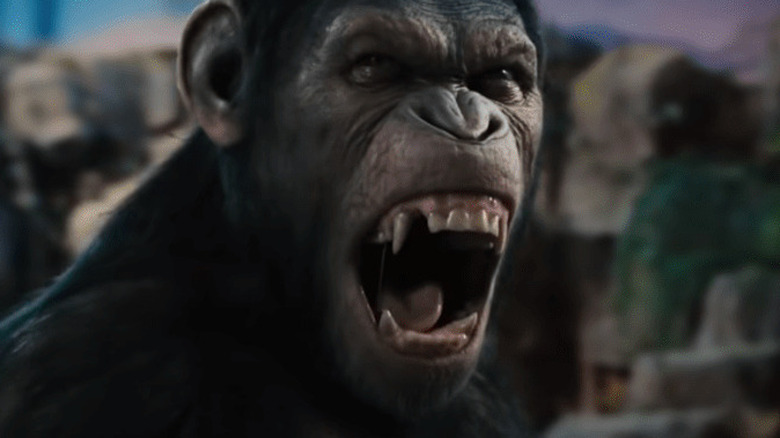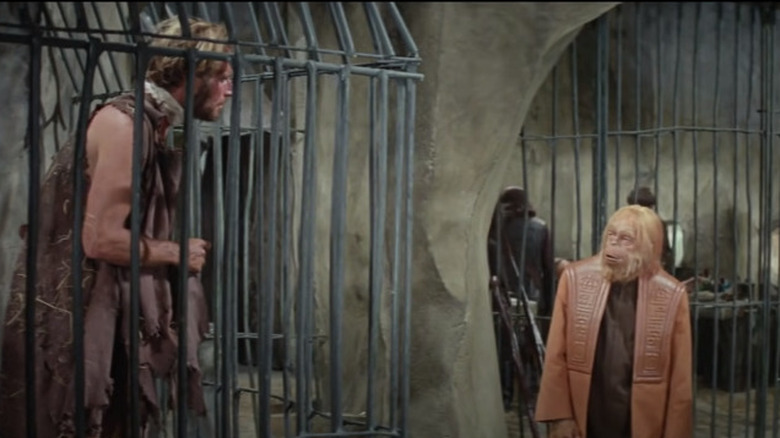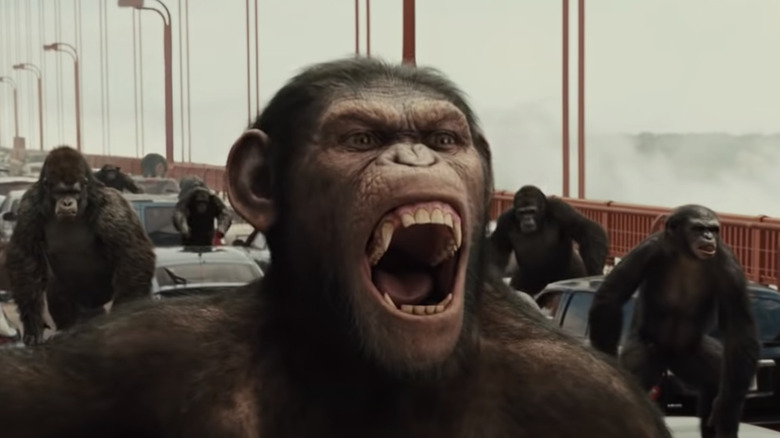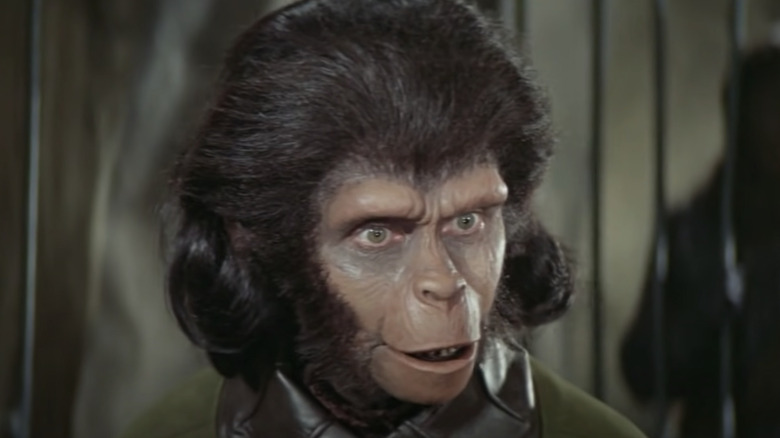How To Start Watching Planet Of The Apes
When "Planet of the Apes" was first released in 1968, it gave the world one of the most famous and beloved sci-fi flicks in history. It also kicked off a series of movies that would span decades, albeit with wildly varying quality. All in all, there are nine movies in the "Planet of the Apes" series. This counts the iconic first entry, where George Taylor (Charlton Heston) is an astronaut stranded on a planet ruled by highly intelligent simians, only to find that it is in fact a post-apocalyptic Earth in the distant future. From there, a franchise was born.
"As soon as the box office returns started piling up," writes the AV Club's Noel Murray, "Fox decided it had to be an ellipsis. Then the studio was faced with a dilemma: How could they possibly improve on a near-perfect science-fiction film?"
From there, the franchise takes some unexpected turns, including a subterranean glimpse into what becomes of the humans who could talk, time travel, and one disappointing reboot before the successful prequels. Now with a new entry, "Kingdom of the Planet of the Apes," in the works, fans looking to refresh their knowledge on the series may be wondering where to start.
How to watch the original Planet of the Apes series
The simplest path is through the order of the films' releases. This means following the 1968 original, viewers will have to take a bizarre turn into "Beneath the Planet of the Apes," which takes audiences into a underground world of mutants dead set on the final destruction of Earth. This is also the send off of Charlton Heston's Taylor.
The series then takes an interesting detour with the next film, "Escape From the Planet of the Apes." Here, Dr. Cornelius (Roddy McDowall), a chimpanzee archeologist, returns with Dr. Zira (Kim Hunter). Both find themselves sent back in time to 1973 Earth, where they are captured by humans before being showered with celebrity status and then being hunted down by government scientists who are fearful that their son, Caesar, will bring about the downfall of humanity.
"Escape" briefly sees the series back on track, and it currently has a 77% on Rotten Tomatoes, which is higher than "Beneath's" score. However, the quality went down again with "Conquest of the Planet of the Apes," which is about the ape rebellion, and "Battle for the Planet of the Apes," which is about the nuclear war that takes down human civilization. Roger Ebert even wrote that "Battle looks like the last gasp of a dying series, a movie made simply to wring the dollars out of any remaining ape fans" (via RogerEbert.com).
How to watch the Planet of the Apes Reboots
Those who want to keep it completely in order of release will then be skipping ahead around 25 years. Given the less-than-stellar place the film series was left in, it is no surprise the next film spent decades in development hell, going through various iterations and directors before landing on Tim Burton's 2001 remake "Planet of the Apes" (via Wired). Despite having an impressive cast at his disposal — Mark Wahlberg, Paul Giamatti, Helena Bonham Carter, and Michael Clarke Duncan — and proving a box office success, Fox opted not to go forward with a planned sequel (via FilmStories.co.uk).
Fast forward another ten years, 2011's "Rise of the Planet of the Apes" is critically praised, a massive financial success, and gains an Oscar nod for best visual effects (via IMDb). Telling the story of how one ape, Caesar (Andy Serkis), becomes intelligent and leads other captive apes to freedom, it serves to tell a story loosely based on the one Cornelius and Zira tell the world in "Escape From the Planet of the Apes." However, a massive difference is that Caesar is not the son of intelligent apes traveling back in time. Instead, he is raised intelligently by a human pharmaceutical chemist (James Franco).
Both reboot sequels — 2014's "Dawn of the Planet of the Apes" and 2017's "War for the Planet of the Apes" — also reconfigure the events of the '70s films, inevitably leading to the world portrayed in the 1968 original. Again, there is a global pandemic, a complete collapse of human civilization, and a war in which apes vie for and eventually achieve supremacy.
How to watch all Planet of the Apes films
Given all the above, there is a way to watch all of the "Planet of the Apes" films as a single sequence of events, at least according to Joe Julians at Radio Times. It can briefly be summed up as watching the reboot trilogy first, in the order of their release, followed by the original five films, again in order of their release.
Julians deliberately leaves off the Burton 2001 reboot, as its events don't fit into either of the two other series. "Keeping in mind that the rebooted trilogy has diverged into its own timeline," Julians writes, "it still works to watch these in this order even if you will spot some fairly major inconsistencies when you get to the original movies."
Going even a bit further, one might say that while the events of the reboot trilogy clearly go in the direction of the 1968 original and its direct sequel, "Beneath the Planet of the Apes," everything from "Escape From the Planet of the Apes" through "Battle for the Planet of the Apes" could represent an alternate timeline. After all, in "Escape From the Planet of the Apes" Cornelius and Zira travel to a moment a good 35 years prior to the events of "Rise of the Planet of the Apes." Potentially, in sharing their own origin myths with the world and giving birth to a son in the '70s, they may have brought about the ape uprising sooner. As with all fan theories, it's a fun thought experiment that may or may not withstand the events of "Kingdom of the Planet of the Apes."



